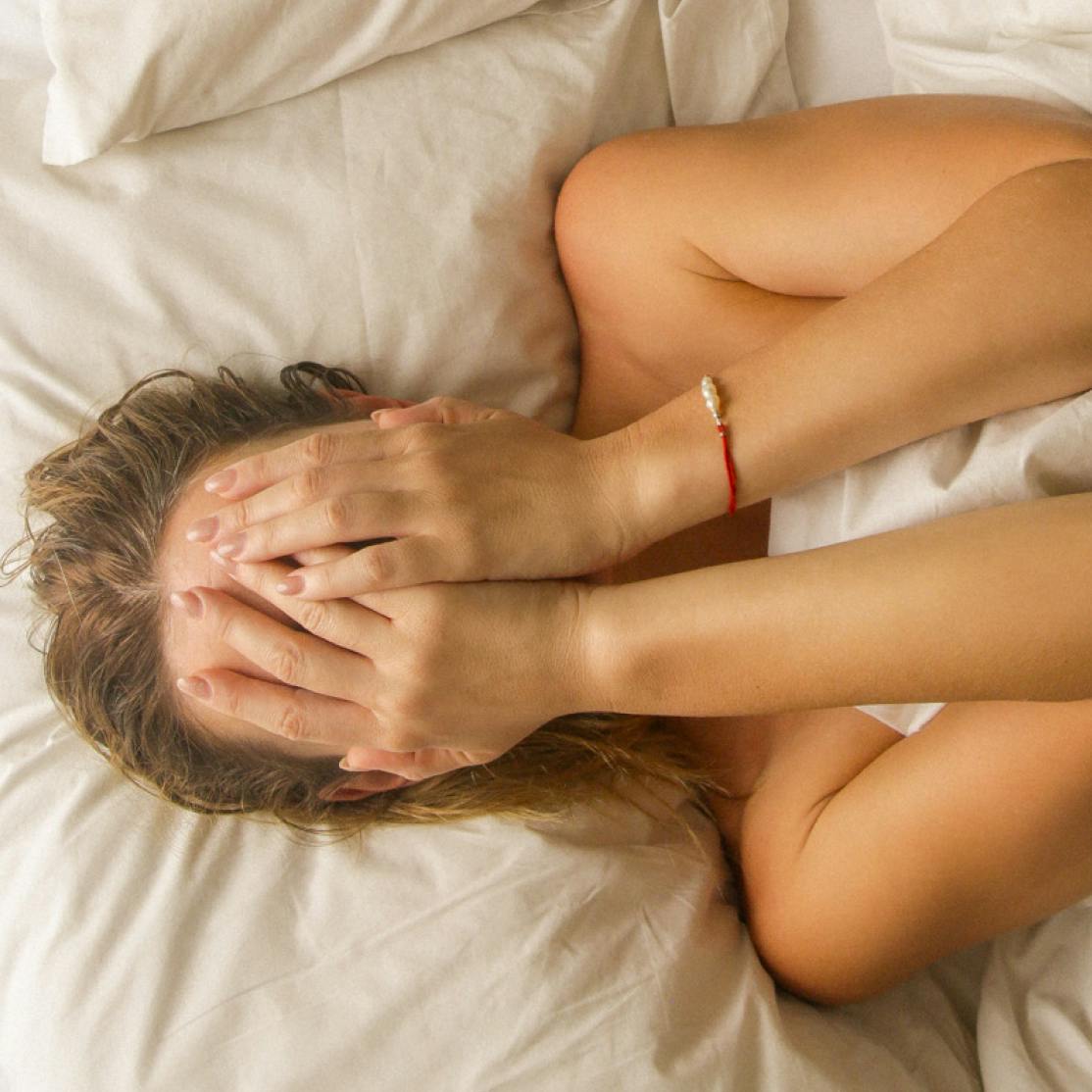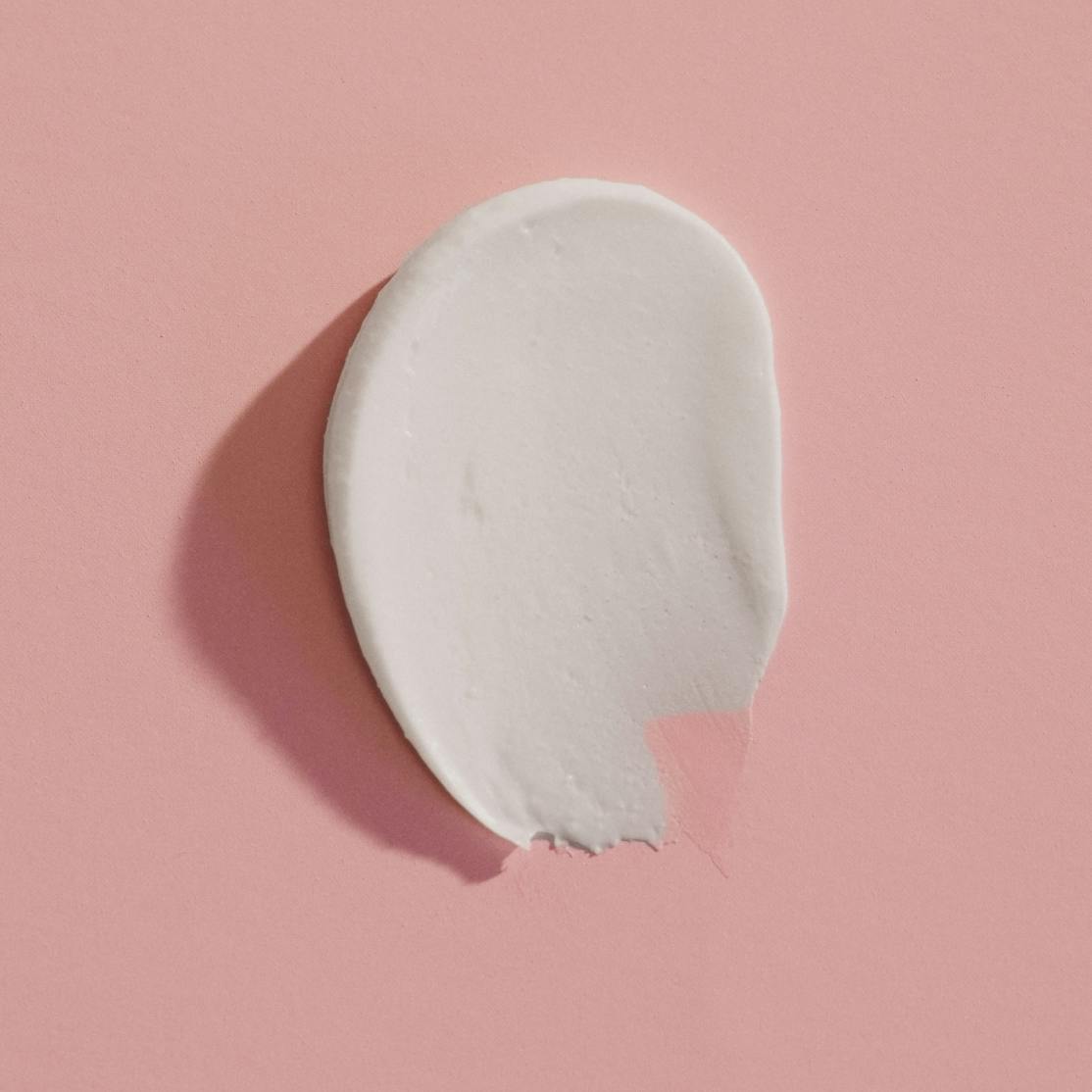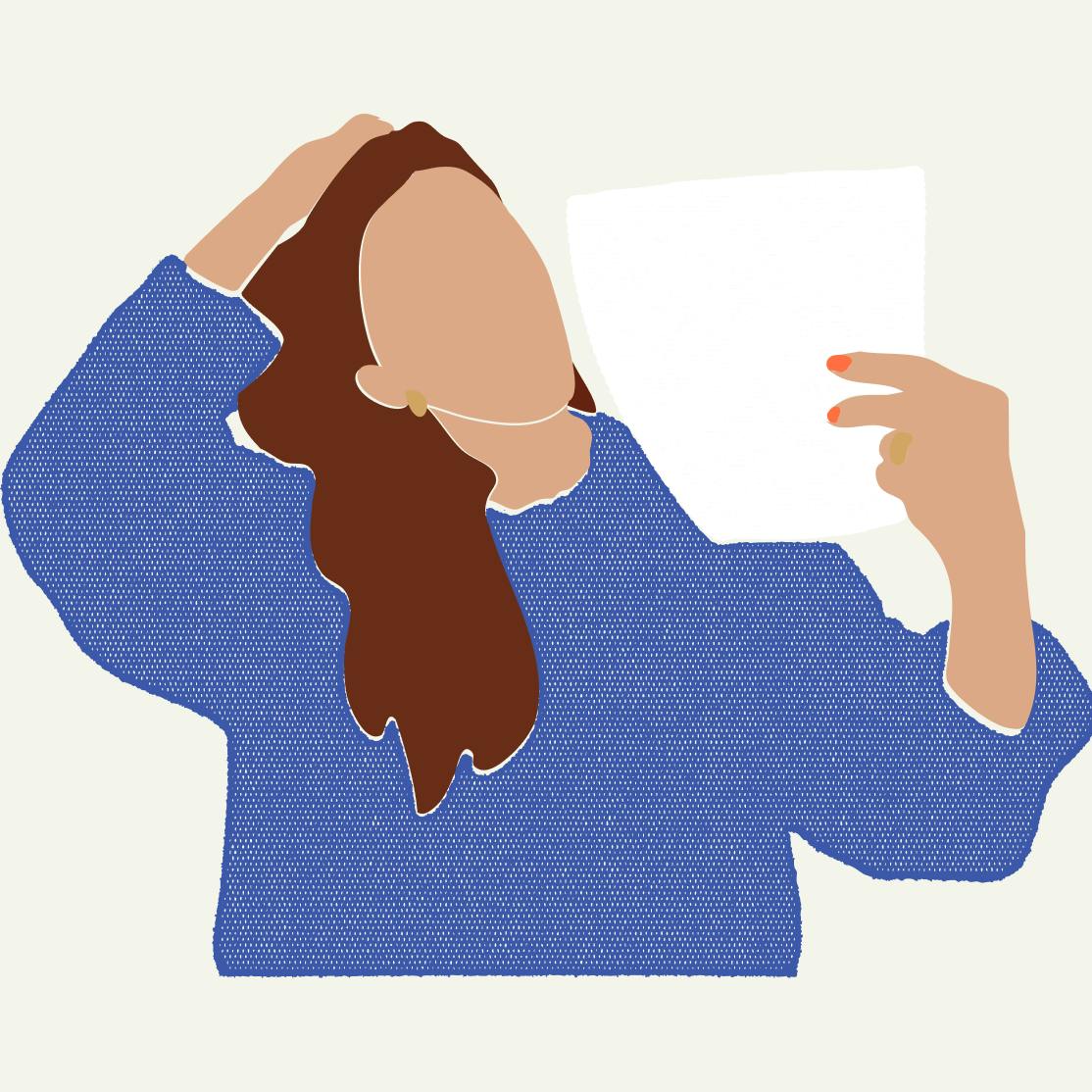Lavender pillow spray? Been there. Lower the thermostat in your bedroom? Done that. For so many women in perimenopause and postmenopause, insomnia is a beast that refuses to be tamed by the same old, tired (ha?) sleep strategies that worked in your 20s and 30s. Fortunately Midi Health is well-versed in the link between menopause and sleep, and our clinicians have a dreamy list of evidence-backed strategies proven to help exhausted women just like you finally catch some damn Zzzs.
When Jessica Svoboda, age 49, recently posted, “What’s up with almost every woman I know waking up between 2 and 3 a.m. nightly?” on Facebook, she received a flood of responses from friends, many of whom were replying between those very hours. Women lamented being awoken by night sweats, anxiety about work or kids, and the need to pee. One friend summed it all up with a simple comment: “Welcome to the club! It’s called perimenopause/menopause.”
Even if your most recent status update didn’t discuss menopause-related insomnia, we’ll bet you can relate. Nearly half of U.S. perimenopausal women struggle with sleep; post-meno, that number jumps to 60%. Hormonal shifts, stress, menopausal symptoms like night sweats, and more cause millions of midlife women to wake up on the wrong side of the bed over and over again.
When you can’t sleep, everything else seems harder—working, parenting, managing your emotions, and just “adulting” in general. Perimenopausal sleep issues do more than leave you dragging and cranky, though; poor sleep raises your risk of heart disease, diabetes, weight gain, cognitive decline, and more.
Whether you can’t seem to drift off, bolt awake at 2 a.m. in an anxious sweat or toss and turn like clothes in a tumble dryer, menopause-related insomnia is a ubiquitous, critical midlife health concern. But women don’t always mention it to their clinicians.
“I think that, too often, women just accept poor sleep as the natural evolution of life and don’t realize there are steps they can take to help,” says Midi’s Chief Medical Officer Kathleen Jordan, MD.
Well, we’re here to change that. Solid, restful sleep is within your grasp. Once you understand how perimenopausal hormonal fluctuations, daytime stress levels, and potential underlying physical or mental health issues can influence your sleep, you’ll be empowered to make changes that can transform your p.m. hours…or at the very least, have you counting fewer sheep every night.
Understanding Menopause and Sleep
It takes a lot more than your head hitting the pillow to kick off a solid night of sleep. The following midlife factors all play a make-or-break role in you snagging the slumber you need to thrive:
Menopause and sleep link #1: Midlife hormonal changes have far-reaching effects on sleep.
Estrogen regulates women’s menstrual cycles, but did you know it helps regulate your sleep-wake cycle, too? This hormone supports the production of serotonin, norepinephrine, and acetylcholine, which are all neurotransmitters that influence sleep patterns. As estrogen embarks on its rollercoaster-y perimenopausal descent, those three brain chemicals go up and down as well, often making it trickier to fall or stay asleep.

Progesterone, estrogen’s sidekick, also supports good quality sleep, as its naturally calming qualities buffer anxiety by revving activity of the sedating neurotransmitter gamma-aminobutyric acid (GABA). Like estrogen, progesterone dips during perimenopause and menopause, contributing to sleep issues that often manifest as overthinking or worrying when all you want is to be conked out.
Melatonin, a hormone that helps orchestrate our circadian rhythm (the 24-hour clock that quietly signals when it’s time to hit the sack), also tends to lose its oomph with age. This midlife melatonin shift can cause insomnia.
Menopause and sleep link #2: Menopausal symptoms like night sweats and joint pain can further rob you of rest.
There are over 100 symptoms of menopause, and not only do they not care if you’re exhausted, but some of them actually prefer to do their dirty work at night.
Night sweats
Estrogen helps power the hypothalamus, your brain’s temperature regulation center. As estrogen levels bob and weave in midlife, the hypothalamus becomes hypersensitive to even minor changes in body temp and can mistakenly think you’re overheated, even when all you’re doing is peacefully spooning your body pillow.
In response, the hypothalamus tells your body to enter cooldown mode. Blood vessels near your skin’s surface expand, sweat glands spring into action, and blood flow and heart rate increase.
In midlife, 75% of women experience these unpleasant temperature shifts. When the internal-furnace sensation hits during the day, it’s called a hot flash; when it wakes you from slumber, it’s referred to as night sweats. (Collectively, hormone-fueled temperature swings are called vasomotor symptoms.) Research suggests that for midlife women, night sweats cause one out of every three nighttime awakenings.
Waking up to pee
In your 20s, you could chase several cocktails with a gallon of water before bed and sleep like a rock. Now so much as a sip of liquid after dinnertime has you waking in the “wee” hours of the morning.
Several factors work together to make nighttime urination, called nocturia, more common in midlife. One example: Estrogen supports the bladder. When levels drop in peri, the organ weakens, so it takes less urine in the bladder before it starts to yell, “Wake up and pee!” at your snoozing brain.
In a 2025 Menopause study involving 3,000-plus women, those in perimenopause were 2.3 times more likely to need to pee three or more times per night than premenopausal women; postmenopausal women were nearly 2 times more likely.
Other midlife symptoms that can bankrupt your sleep include achy joints, itchy skin, and age-related sleep conditions such as obstructive sleep apnea (when breathing is briefly interrupted during sleep due to a blocked airway) and restless leg syndrome (a neurological condition that creates an inexplicable urge to move your legs). Both warrant a trip to the doctor.
Menopause and sleep link #3: The stress of midlife is a total nightmare.
Worrying thoughts—about family, work, world events—seem to hit their stride at night. On top of that, hormonal volatility can further turn perimenopause into prime time for mental health challenges such as depression and anxiety, both of which can flare up as you lie in bed without the usual daytime distractions.
“Progesterone and estrogen are known as the ‘zen hormones,’ thanks to progesterone’s impact on the calming neurotransmitter GABA and estrogen’s effects on the production of serotonin, the feel-good brain chemical involved in mood regulation,” Dr. Jordan explains. “When estrogen and progesterone fluctuate in midlife, women don’t get the physiologic support they need to manage their stress as efficiently as we used to.”
Anxiety and depression both decrease time spent in the more restorative sleep stages and can trigger the release of cortisol, a hyperarousing stress hormone that acts like gasoline on the flames of insomnia.

What Is Menopausal Insomnia?
Like pj’s and pillowcases, perimenopausal sleep concerns come in all sizes and colors. Insomnia is a sleep disorder that can look like any or all of the following:
- trouble falling asleep
- difficulty staying asleep throughout the night
- trouble returning to sleep after a middle-of-the-night awakening
- waking up earlier than desired
The second and third symptoms, aka sleep maintenance insomnia, tend to be the most common pain points.
“In longitudinal studies following women from the late reproductive phase—early 40s—into perimenopause and then the first few years postmenopause, you see a gradual increase in waking up at night and not being able to fall back asleep,” says Fiona Baker, PhD, an internationally recognized women’s sleep expert and director of the Center for Health Sciences at SRI International, a nonprofit research organization based in Menlo Park, Calif.
Rates of sleep maintenance insomnia tend to taper slightly as you move deeper into postmenopause, Baker says, “but symptoms don’t completely go away.” And even then, rates of other sleep troubles, like sleep apnea, increase among women as they move further past menopause.
The effects of menopause-related insomnia bleed into daytime life, often causing symptoms such as:
- persistent daytime fatigue
- brain fog
- impaired focus, attention span, and judgment
- mood shifts, irritability, and anxiety
According to the National Sleep Foundation, about 40 million Americans experience insomnia every year—and women are more likely to experience it than men.
Two main types of insomnia exist: acute and chronic. Acute insomnia is short term (less than 3 months), often sparked by a stressful life event like divorce or the death of a loved one. For a chronic insomnia diagnosis, bouts of sleeplessness must have persisted for at least 3 nights per week for at least 3 months, and they must cause significant disruption to your waking hours.
Better Sleep Is Possible
Effective Treatments for Perimenopause- and Menopause-Related Insomnia
Menopausal insomnia is one of the most common symptoms we treat at Midi. In a recent survey of 100,000 Midi patients, 93% of perimenopausal respondents said yes when asked, “Are you having trouble sleeping?’’
You deserve to wake up feeling refreshed and energized. Midi’s holistic approach to sleep blends conventional medicine with lifestyle coaching, hormonal supplementation, botanical remedies, and more to help restore your rest. Check out some of our evidence-based strategies for turning insomnia during menopause into menopauzzzzzz:
Hormonal Prescriptions
Hormone replacement therapy (HRT), also referred to as hormone therapy (HT) or menopausal hormone therapy (MHT), which adds back a fraction of the estrogen your body has lost in perimenopause (plus progesterone if you still have your uterus) has been shown to ease menopause-related insomnia and other midlife sleep disturbances, especially in women waking up from night sweats.
HRT is considered the most effective treatment for relieving perimenopausal hot flashes and night sweats, according to the most recent guidelines from The Menopause Society.
Dr. Jordan says women often feel immense relief after starting HRT: “Something we hear very often is, ‘This is the first time I’ve slept well in 5 years.’ It’s an undertapped tool for perimenopause- and menopause-related sleep issues.” That said, “the answer is not always that HRT solves all of your issues. HRT is a very effective tool for women in midlife, but it’s one tool. There are women who can or don’t want to take HRT, and we can help them sleep, too.”
Nonhormonal Prescription Medications
Hormone-free sleep aids for menopause to consider:
- Veozah (fezolinetant): This is a newer FDA-approved, hormone-free treatment option for moderate to severe hot flashes and night sweats caused by menopause.
- Gabapentin (neurontin): Historically used to treat seizures, post-shingles nerve pain, and restless legs syndrome, some doctors prescribe this medication off-label to improve vasomotor symptoms and insomnia.
- Prescription sleep aids: There’s no shortage of short-acting sleep drugs on the market, including benzodiazepines like Xanax (alprazolam) and Valium (diazepam), and Z-drugs, such as Ambien (zolpidem), Sonata (zaleplon), and Lunesta (eszopiclone). While they often help in the short term, concerns over their addictive qualities and link with cognitive difficulties mean “we prescribe very few sleeping aids,” Dr. Jordan says.
Lifestyle Modifications to Improve Sleep
If you’ve already tried bullying yourself into going to bed earlier but still spend the hours leading up to midnight messing around, you know that cultivating sleep-friendly habits isn’t always easy. Midi clinicians act like accountability buddies, explaining some of the more basic sleep-supportive strategies in ways that click, then cheering you on from the sidelines as you take a crack at them.
Some tried-and-true tactics include:
- Maintaining a consistent sleep-wake schedule. Sounds easy, but if you’re one to stay up later on random nights or sleep later on weekends, you’re doing yourself a disservice. Sticking to a fairly consistent schedule helps prime your body for better rest.
- Cut back on caffeine and alcohol, or at least be intentional about what time of day you stop consuming them. People metabolize caffeine and alcohol very differently, so hard-and-fast cutoff times aren’t realistic. Instead, explore when it’s best for you to have your last cup of coffee or glass of wine if you’re noticing negative impacts on your sleep.
- Hit your exercise goals to fall asleep more easily. That pickleball game or yoga class will help tire you out, boost melatonin production, aid in body temperature regulation, and act as an all-around antidote to stress.
- Chill out your bedroom routine by lowering the thermostat (Dr. Jordan suggests 67°F as a good, research-backed starting point for women who run hot) and wearing cool-to-the-touch pj’s made of sweat-wicking materials like bamboo, rayon, and linen. Also consider a climate-controlling bed unit that circulates air beneath the sheets and helps evaporate sweat.
For some more out-of-the-box menopause sleep aids…
If you sleep with a loud/fidgety/sheet-hogging partner, consider a sleep divorce.
In a 2024 SleepFoundation.org survey of 1,000 adults with snoring partners, 44% reported their partner’s noisy antics led to daytime fatigue, 33% felt cranky or moody, and 23% had trouble concentrating.
Having someone snatch the comforter off of you like a magician with a tablecloth at midnight as they attempt to burrito themselves isn’t doing your sleep any favors, either. Maybe that’s why nearly one-third of Americans have engaged in sleep divorce behavior, including sleeping in a different room than their partner or opting for a separate bed in the same room.
Or try the Scandinavian sleep method, which is really just co-sleeping but with separate bed toppers. Besides offering customized temperature regulation (downy duvet for Partner A, weighted blanket for Partner B), this also reduces the odds of being awoken by someone yanking your covers at 2 a.m.
Dr. Jordan says switching up your sleep environment can make a huge difference, too.
“I had one patient who told me that moving into separate bedrooms was life-changing for her in terms of sleep.”
Try cognitive behavioral therapy for insomnia (CBT-I).
CBT is a tried-and-true form of talk therapy that prioritizes changing unhealthy or unhelpful thinking and behavioral patterns to ease depression, anxiety, marital or substance abuse problems, and more. In an offshoot of CBT called CBT-I, a specially trained therapist teaches you how to untangle and reframe negative thoughts that might be perpetuating unhealthy sleep patterns (like “I’ll never sleep tonight” or “I’m going to be a total mess tomorrow.”). CBT-I can work as well as pharmacological treatments in midlife women and has no side effects. Plus, the results last long after treatment ends. It can also minimize the impact of night sweats, anxiety, and other sleep-sabotaging menopause symptoms. Visit The International Directory of CBT-I Providers to find a local CBT-I professional.
Supplements for Sleep
Looking for a more natural menopause sleep aid? The following supplements may help certain perimenopause- and menopause-related sleep concerns.
Melatonin
Yep, this is the same circadian rhythm–regulating hormone that’s made by your brain, but in supplement form. A 2022 review and meta-analysis of 23 studies found that melatonin had “significant” positive effects on sleep quality. Melatonin doesn’t work for everyone, but when it does, it seems to be particularly helpful for women who have trouble falling asleep. As a bonus, melatonin supplementation may also help slow menopausal bone loss.
Magnesium
Supplementation with this mineral may pave the way for longer sleep times and less fatigue. Magnesium can have a calming effect, which helps explain its recent 15 minutes of fame when it starred in the viral Sleepy Girl mocktail that exploded on TikTok. (Influencers touted magnesium powder mixed with tart cherry juice and a fizzy mixer like prebiotic soda as an insomnia antidote.)
If you can’t get enough magnesium from your diet (some sources: spinach, almonds, black beans, chia seeds), your Midi clinician may recommend a supplement. Stick with magnesium glycinate, which has the fewest side effects. (Magnesium citrate can cause diarrhea.)
So many other supplements exist, too. Your healthcare professional or Midi clinician can walk you through the possibilities, helping you find the right supplement for your unique sleep symptoms. The amino acid L-theanine, for instance, aids in stress reduction, so that may better suit women with anxiety-fueled insomnia, whereas someone kept up by restless leg syndrome may do better with valerian, a flowering herb shown to work as well as gabapentin.
Key Takeaways
- Menopause-related insomnia is more the norm than the exception, affecting close to half of perimenopausal women and 60% of postmenopausal women.
- The overwhelming majority of Midi patients report having trouble sleeping.
- The main culprits behind perimenopausal and menopausal insomnia? Hormonal shifts and other midlife symptoms like night sweats, sore joints, and mood dysregulation, plus stress and age-related sleep conditions such as sleep apnea and restless leg syndrome.
- Perimenopause and sleep don’t have to be such strange bedfellows. With the right support, better sleep is within your reach. Midi combines multiple strategies to address the physical and emotional toll of chronic sleeplessness, including hormone therapy, nonhormonal medications, lifestyle tweaks, and supplements. We’ll work with you to personalize your care, helping you get the rest your body craves and deserves.
If you’re in perimenopause or menopause and want guidance from clinicians who specialize in women’s midlife health, book a virtual visit with Midi today.
Hormonal change is at the root of dozens of symptoms women experience in the years before and after their period stops.
Our trained menopause specialists can help you connect the dots to guide you towards safe, effective solutions.
Whether you need personalized guidance or a prescription routine to tackle symptoms—including brain fog, hot flashes, sleep trouble, mood swings, and weight gain—we’ve got you covered. Learn more here.
Midi’s mission is to revolutionize healthcare for women at midlife, wherever they live and whatever their health story. We believe that starts with education, to help all of us understand our always-changing bodies and health needs. Our core values guide everything we do, including standards that ensure the quality and trustworthiness of our content and editorial processes. We’re committed to providing information that is up-to-date, accurate, and relies on evidence-based research and peer-reviewed journals. For more details on our editorial process, see here.


 Claudia Levine, MD
Claudia Levine, MD



